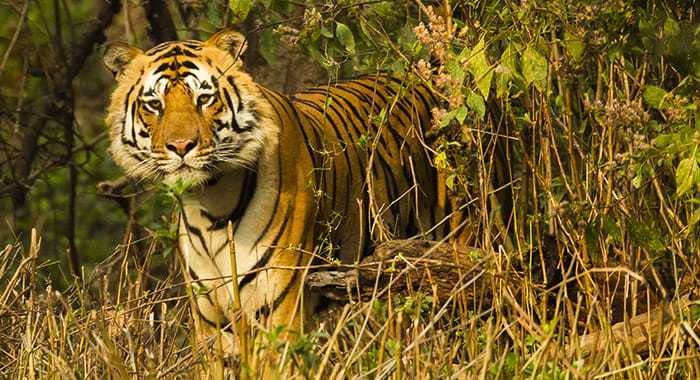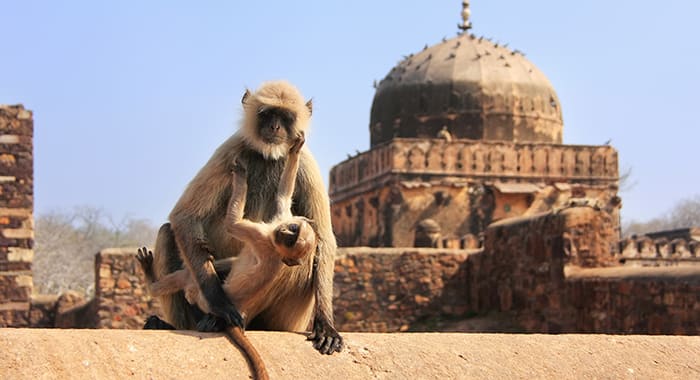Tigers are some of the most majestic animals in the world. Each one is unique; no two tigers have the same pattern of stripes. They can grow over 10 feet in length and weigh up to 61 stone. Their roar can be heard as far as 2 miles away. Their top speed is 40 miles per hour and they can leap over 26 feet.
Contrary to popular belief, they don’t live in the wild in Africa. You’ll have to go to Asia or the far east of Russia to see them. Spare yourself the Russian weather and get yourself to India, home to around 10% of the world’s wildlife. Amongst this rich diversity, there’s the highest range of wildcats in the world. This includes around 60% of the global tiger population. Simply put, it’s probably the best place in the world to see tigers.
Not to overload on facts, but there’s 51 tiger reserves in the country, meaning your spoilt for choice. Also making it hard to pick our top places to see them. Project Tiger was an initiative launched in 1973 aimed at conserving the Bengal tigers in their natural habitat. The first parks to benefit from this were Corbett, Kanha, Bandhavgarh and Ranthambhore. In these older parks, the tigers are more comfortable with the presence of vehicles and therefore don’t shy away, making them a must on our list.
Corbett Tiger Reserve
Let’s start at Corbett Tiger Reserve in the northern state of Uttarakhand. This is where the record breaking tiger was found, measuring 11 feet 1 over curves and weighing 61 stone. That’s a big cat. Corbett is the oldest national park in India and around a 4.5 hour drive from Delhi. It offers a different variety of wildlife when compared to central India. Within its thick forests and rugged grasslands, you’ll find Asiatic elephants, half of India’s bird diversity, and all of India’s species of otters. Not to mention the Bengal tigers.
At the foothill of the Himalayas, Corbett draws visitors in with its diverse landscapes. It must be explored in two parts. The lower level’s riverine is home to crocodiles, swamp deer and elephants. While the upper level reveals more birdlife and animals like mountain goats, serow and black bears. It was once home to a legendary tiger named Khali, after the WWE heavyweight champion Great Khali, who was one of the most feared tigers around.
Kanha Tiger Reserve
Kanha is the oldest and largest of the tiger reserves in Madhya Pradesh, a state in central India. The forest in Rudyard Kipling’s novel The Jungle Book is said to be based on this reserve. You might not find a Baloo, Bagheera or Mowgli here, but you’ve got a pretty good chance of spotting a Shere Khan. The numbers of tigers are rising year on year.
While wandering or driving through the forest on the lookout for tigers, you’ll bump into a whole range of other wildlife. From leopards and sloth bears to honey badgers and antelopes. This is the only place in the country where you can see wild hard ground barasinghas.
Bandhavgarh Tiger Reserve
Also in Madhya Pradesh, Bandhavgarh is one of India’s most well-known reserves. It is said to contain the highest known density of tigers in India, although some people beg to differ. Either way, you’ve got a pretty good chance of seeing the big cats. Within the park there’s an ancient fort, believed to be some 2000 years old.
Bandhavgarh was once one of the few places where white tigers could be seen in the wild. Out of the six subspecies of tigers; Sumatran, Amur, Bengal, Indochinese, South China and Malayan, it’s generally Bengal that are known to develop this appearance. For this to happen, both parents must carry the gene for white colouring – something that only happens naturally about once in 10,000 births.
Ranthambore Tiger Reserve
Ranthambore is near the town of Sawai Madhopur in Rajasthan state, northern India. There are a few reasons why Ranthambore is one of our favourite reserves. It’s got a nice mix of heritage, nature and wildlife. Structures and ruins dot the landscape and a big fort overlooks it all. Look closely and you might spot a tiger sitting in a window or under a cenotaph. Or if driving by the lakes, you might catch one going for a swim in the waters to cool down.
The park is split into ten tourist zones and as such, there isn’t a build-up of vehicles and the environment is less disturbed. Surrounding villages have great women empowerment programs and artist schools that add to the experience.
Any of these reserves can easily be added into a tour of India, acting as an ideal contrast to the sights and sounds of the cities. After soaking up the culture, top off your adventure by seeing these fantastic animals in their natural environment. To see how this would work, feel free to browse our collection of tailor made tours. They’re fully customisable, so if you want to do something differently then that’s fine too!











